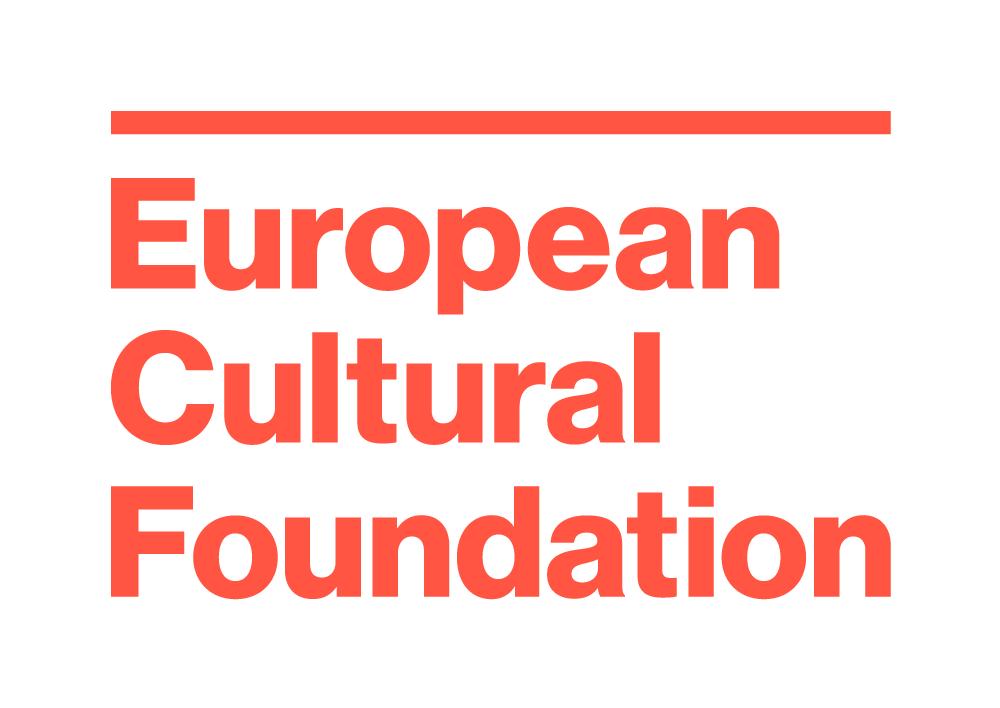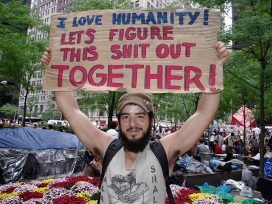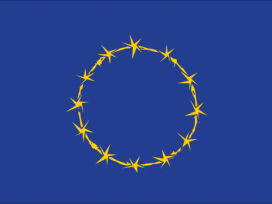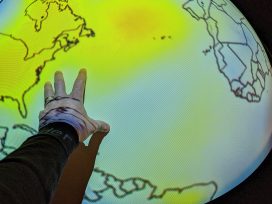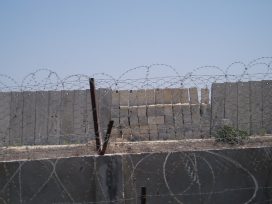Fear it not
He and his family fled Iraq for Poland in the 1970s, never to return. Basil Kerski knows from firsthand experience that integration can be a long and difficult process, but it usually enriches receiving societies and new arrivals alike. As further migrations and intercultural encounters undoubtedly await Europe, Kerski argues in favour of European solidarity.
My personal biography and family history are the reasons why I will always sympathize with migrants and refugees. Many times throughout my life, I have crossed borders of cultures, nations and states. My mother is Polish and my father is Iraqi. I was born in communist Poland in the city of Gdansk. There, I spent the first years of my life. One year, we went with my parents for summer holidays in Iraq. While there, we were stopped by the authorities. My father, who was a medical doctor, could not leave the country. Instead, he was conscripted into the army and sent to the frontlines of the Iraqi-Kurdish war. We were forced to stay in Iraq. It was a difficult experience for our family. Yet after the war ended, I made frequent trips between Poland and Iraq and I found myself functioning between the two cultures.
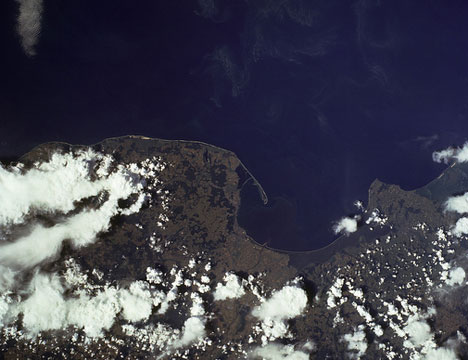
“These migration experiences have fundamentally shaped me and expanded my horizons. That is why, I have a feeling now that I can look at Poland, and Europe, from a wider, more global perspective”, writes Kerski; pictured above: a satellite image of Gdansk. Photo: NASA Johnson. Source: Flickr
My childhood experience in Iraq was strongly influenced by its multiculturalism. On the playground, I would spend time roughhousing with both Christian and Muslim children. Baghdad at that time was home to many secular urban families, whose way of living was very westernized. Despite that, and Iraq’s growing prosperity, my parents were convinced that there was no place for us in the country. They feared that Saddam Hussein, the leader of the ruling nationalist Baath party, would one day create a totalitarian system. It turned out that they were right.
Great potential, not just threats
My parents dreamt of a life in freedom. To make it come true, they decided to leave Iraq, but it was not easy for my father to get out of the country. It was in 1976 when he was finally allowed to get a passport and we left for Gdansk. To the regime, a family reunion was a legitimate reason for the trip. Also, as Poland at that time was under a communist dictatorship and the country was in a major economic crisis, the Iraqi authorities did not think that my father would give up his job in Iraq and move there. However, for my parents, freedom was more important than anything else.
We have never returned to my father’s homeland. For me, this meant another process of cultural adaptation. I was enrolled in a Polish elementary school but after the time spent in Iraq, it was clear that I had to improve my Polish. However, this was not the only experience my family had of being migrants. After leaving Iraq, it soon became clear that communist Poland offered no opportunities for my father. In 1978 he went to West Berlin and a year later we joined him, together with my mother. Again, I found myself in a new culture and had to learn a new language.
These migration experiences have fundamentally shaped me and expanded my horizons. That is why, I have a feeling now that I can look at Poland, and Europe, from a wider, more global perspective. It allows me to see the great potential, and not just the threats, in the migrations and intercultural encounters that further await Europe. I am fully aware of how difficult it is to draw a demarcation line between the different causes of migration (political, cultural and economic) and how difficult it is to distinguish between a migrant and a refugee.
It is easy to judge the migrants who are coming to Europe and say that they are seeking shelter, not for political, but “purely” economic reasons. However, when making such statements we often forget that poverty and conflict in Europe’s neighbourhood are a result of both our short-sighted policies towards these regions and our own protectionism – closed markets and post-colonial interests.
Open up to the Other
We cannot neglect the fact that integration is a long and difficult process. I have seen first-hand, migrants’ determination to adapt to new conditions as well as the efforts they make to learn a new language and culture. I have seen how they respect their new homeland and its people. However, I also know that there are failures in this adaptation which can be a result of, for example, the fact that somebody decided to emigrate at an older age and thus cannot easily adapt to a new society. I myself have experienced closed doors and a lack of acceptance. It is not enough for migrants to demonstrate their efforts and goodwill. This is just one dimension of the integration process.
The fear that societies feel towards the Other and the anxieties and resentment immigration stirs are universal. Thus, it was only for my own psychological comfort that I have tried to understand the humiliation which I experienced for being different and I still prefer to keep the positive experiences in my memories, including the openness and interest in my cultural backgrounds. With this in mind, I am not oblivious to the difficulties of encounters with the Other. Trying to understand the fears that surround these meetings, I am interested in how we can overcome them. The first step is to accept that they exist and treat them seriously. We can also help people to calmly express them and by doing so help them prepare to open up to the Other.
Had my family not escaped Iraq, and if I had not therefore been a migrant, I would probably not be alive today. In the last 30 years, Iraq has experienced wars which would have been my own personal experience had I stayed there. I am deeply convinced that we should not look at migration only from the perspective of the receiving countries and their capacities to take in migrants. In my view, we should attempt to understand the other side and look deeper to understand who these migrants are. Where do they come from and why? Many people are dramatically ill-informed in this regard. What we also lack is a long-term perspective.
Integration is not just a problem of the migrants’ efforts and readiness to integrate with the culture of the states and societies that are hosting them. There is also another side to this process, one that is under-represented in our public debates. Integration is successful only when we want to integrate the migrants, accept them and support their efforts to integrate. Then, they quickly become a part of our society, contribute to our prosperity and their children become naturalized citizens of the nation that accepted them. This is the dominant dynamic. Thus, it should be remembered that the prerequisite for successful integration lies in the goodwill and openness of the societies and nations that are accepting the migrants.
A dangerous illusion
Again, let me make reference to my personal experience. After our return from Iraq, my beginnings in the Polish school were very difficult. In communist Poland, the cultural parochialism was depressing and the level of racism very high. Thus, my schoolmates would shout at me “Arab”, “Arab”. However, after half a year, I became an integral part of the class. This was an interesting experience: from initial unwillingness to complete acceptance. For me, it helped me understand that there are hidden contradictory elements within Polish society which are not solely limited to fears and stereotypes, but also include great potential for tolerance and brotherhood. This positive energy needs to be further elicited and the responsibility for doing so lies largely with the authorities.
As mentioned earlier, in the late 1970s, we moved to West Berlin. This was a time when West Germany already had some experience of accepting migrants, but was still opposed to the idea of becoming a multicultural society. The obstacle against the creation of a multicultural society was the German understanding of the state as an ethnic, not political, community. For those who had German ancestors, it was easy to legalize their stay in Germany, attend German language courses and receive financial aid. In our family, we initially did not have much hope that the status of our stay would be legalized. In the end, we were saved by the martial law which was introduced in Poland in December 1981 and which extinguished the possibility of our return. The West German authorities could no longer deport us. In addition, my father, being an Iraqi, was allowed to obtain political asylum and a work permit.
Looking at Central Europe today I see that its thinking is still similar to that of West Germany in the late 1970s and 1980s. For its broadly homogenous societies, there is a natural aversion to multiculturalism. It is easy to divide people based on their ethnicity, but this is a dangerous illusion and I warn Poland and others against going down this road.
Neighbours for decades
In Germany, where the situation is still far from perfect, a few important changes have taken place over the last 30 years. Since the second half of the 1990s, the federal government (a coalition between the Social-Democrats and the Greens) has started to openly talk about Germany as a nation of migrants, a multicultural state that for decades has been accepting migrants. The first generations of Gastarbeiter (migrant workers – NEE) had entered politics and as a result, reforms in civil liberties were initiated. The definition of the nation was broadened to include its political dimension. As a result, a person who does not have German ancestry can now also become a German citizen. There is also increasing acceptance in regards to dual citizenship. This represents a political and cultural revolution. Changes in German education have also led to an approach which has become more and more adjusted to the multicultural history of Germany. In school curricula, for example, there is more room for the history of Central Europe. Language instruction has been expanded to include languages that are used by large groups of migrants such as Turkish, Italian, Spanish, and even – as is the case of the school attended by my younger son – Polish.
In German culture, media and politics, people with immigrant backgrounds but who were already born in Germany, are very visible. They speak German fluently and want to mark their presence in the public sphere. A good example is the leader of the Green Party, Cem Ozdemir, deputy mayor of Berlin Dilek Kolat, film director Fatih Akim and well-known German writers like Ilja Trojanow and Navid Kermani. Without a doubt, we are still in the very early stages of the process of culturally opening up the German nation. It is too early to talk about a positive German model. Furthermore, the process has generated some backlash within German society. The best-known example here is the xenophobic, anti-Islamic movement PEGIDA which, paradoxically, has strong levels of support in places where there are few foreign-born migrants, such as Saxony and the eastern parts of Germany.
Unquestionably, there are also some other positive aspects that could have been observed recently in the development of political culture in Germany. The wave of solidarity with the refugees from the south, which we have been seeing in the last few months and which resembles the wave of unity with the Polish Solidarity movement in the 1980s, is not the result of “naïve” political correctness. Nor, as has often been written in the Polish press, is it a reflection of a “sense of guilt for Nazi crimes”. Rather, it is the result of experience. For today’s Germans, refugees and migrants are not phantoms. They are their neighbours and have been for decades.
Four sources of migration waves
Poles, on the other hand, are now involved in an absurd debate about the threats that migrants (especially from Muslim countries) generate. These fears are not the result of direct experience as Poland has had very little recent contact with Islam. In fact, only 0.3 per cent of Poland’s residents are foreigners. That is why not many people realize, for example, that Syrian Muslims are escaping from radical Islam or the fact that the majority of the Muslim world condemn the so-called Islamic State of Iraq and Syria (ISIS), which is not a religious, but totalitarian movement. Germans are able to distinguish between Islam as a religion and the radical political organizations which only make references to religion. They are capable of making this distinction because they have had a positive experience of living with these migrants over the preceding decades.
It is also worth realizing that Europe is a continent that participates in the dynamic migration processes to only a small extent. Massive migration waves happen in places where there is war and where states are collapsing. Regionally speaking, this includes places like the Middle East, Africa and South America. Today, 90 per cent of refugees from Syria have been accepted by that nation’s neighbouring states. In Turkey, there are already around two million refugees from Syria. Hundreds of thousands fled to Lebanon, as well as Jordan, and only a fraction of them have attempted the journey to Europe. These statistics make Poland’s debate over accepting a few thousand refugees seem churlish and uncompassionate.
Generally speaking, the European Union is faced with four sources of migration. The first is from Northern and Central Africa, where a combination of different factors – climate, ethnic and religious wars – have led to the collapse of some states. It is also important to note the partial failure of the Arab revolutions (except for Tunisia, which has opened the door to transformation), which led to a serious instability in Libya. The second source is the Middle East, with a shocking number of victims created by the civil war in Syria. The erosion of the Iraqi state and the increasing activities of ISIS, which has forced many people to flee the region, is also a key factor.
The third source is eastern Ukraine, as a result of the war currently taking place there. At the time of writing, the strongest migration waves are taking place within Ukraine, where the local governments of other regions are taking care of the refugees from war-torn Donbas and occupied Crimea. However, should the situation in Ukraine get politically and economically more unstable, there will be more migration from that country to the West.
Nonetheless, the greatest cause for concern in the EU is not the issue of political refugees fleeing conflict zones. To date, the reactions of Europeans to the refugees arriving from Syria, Iraq and Afghanistan have been quite positive. The situation is different in regards to this fourth source of migration, the movement of people inside Europe. This is primarily referring to migration from the eastern (including Poland) and southern EU states to the richer northern and western countries – Germany, the United Kingdom, France and Sweden. This European migration wave, from the poorest regions to the economic centres of the EU, poses a huge political challenge for member states, as it is becoming a driving force for anti-European attitudes and nostalgia for a Europe that is exclusive and deprived of solidarity as well as a desire for a community of wealthy states, separated from their poorer European neighbours in the east and south. As a result, many EU citizens dream of new iron curtains to divide our continent. It is very ironic that just last year, Hungary was celebrating the fall of the Iron Curtain while today, those same Hungarian anti-communist dissidents are the ones who are closing their borders and building new walls.
European solidarity
The concept of European solidarity is becoming very limited. And it is not only in the case of the wealthy EU member states, but also those who once cared the most about the effectiveness of the idea of European solidarity, including those Polish politicians who now argue against solidarity during the migration debates. As a matter of fact, they have done more harm than good weakening Poland’s position on the international stage. Clearly, if Poland wants to maintain its strong standing in Europe, it cannot run away from being an active participant in shaping European migration policy. Make no mistake, the crisis of a European understanding of solidarity will weaken Poland and strengthen the EU’s opponents at the same time.
That is why Poles in particular should make sure that the concept of European solidarity does not lose its credibility, as the country’s development and sovereignty are heavily dependent on it. Poland still needs significant financial assistance from the EU so it can continue to rebuild parts of the country that were destroyed by both the Second World War and the communist regime. Polish security policy needs solidarity with Europe to support Ukraine, which is still defending its own sovereignty. Finally, Poles are the authors of the concept of the European energy union, which is meant to defend the EU from the neo-imperial energy policies espoused by the Kremlin.
All in all, to successfully implement its strategic goals, Poland should show solidarity with states that need assistance in integrating refugees. Poland’s attitude towards the migration challenge has thus become a principal test of its European policy.
Published 13 November 2015
Original in Polish
Translated by
Iwona Reichardt
First published by New Eastern Europe 6/2015
Contributed by New Eastern Europe © Basil Kerski / New Eastern Europe / Eurozine
PDF/PRINTPublished in
In collaboration with
In focal points
- Disintegration or revival?
- Mobilizing law for solidarity
- Solidarity after Machiavelli: An interview with Ira Katznelson
- Liberalism, populism and the challenges of post-transformation in eastern Europe and beyond
- The limits of solidarity
- On the borders of solidarity
- The crisis of neoliberalism in Europe
- Utopian dreams beyond the border
- The politics of nature in the Anthropocene
- Strangers when we meet: Identity and solidarity
Newsletter
Subscribe to know what’s worth thinking about.
Related Articles
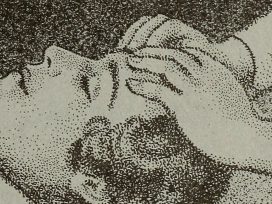
Despite divisive nationalist politics, there are those who manage to overcome the odds, forming meaningful acts of solidarity. Eurozine’s new focal point ‘The world in pieces’ looks critically at what divides, tackling the complexities of destablized identity.
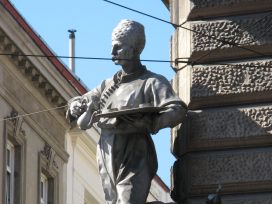
Vienna’s hosting of Ukrainian artists and writers recalls the days of the fin de siècle, when the city was a magnet for intellectuals seeking freedom from Tsarism. But despite strong historical affinities, subtle barriers to solidarity with the Ukrainian exiles remain.
